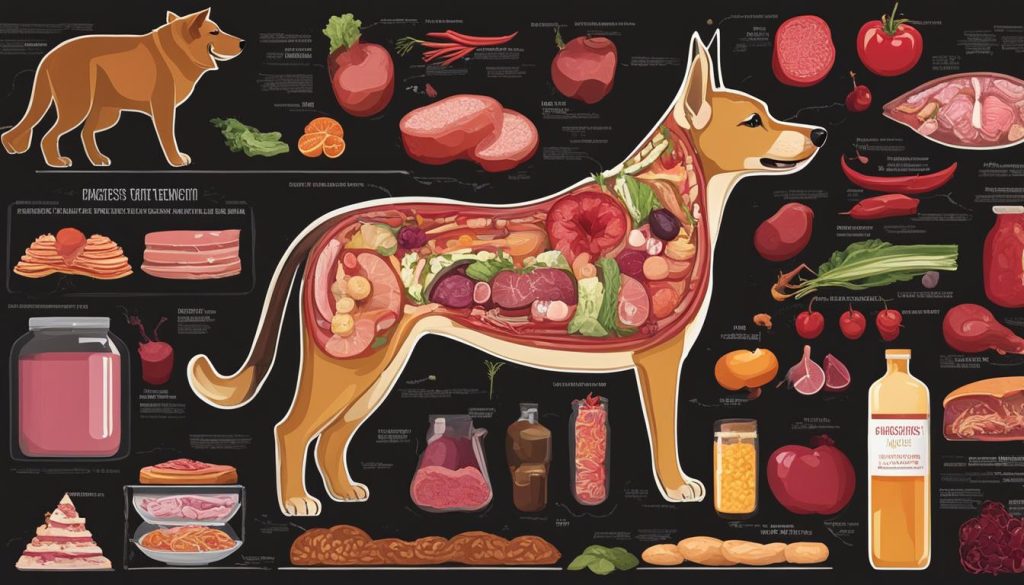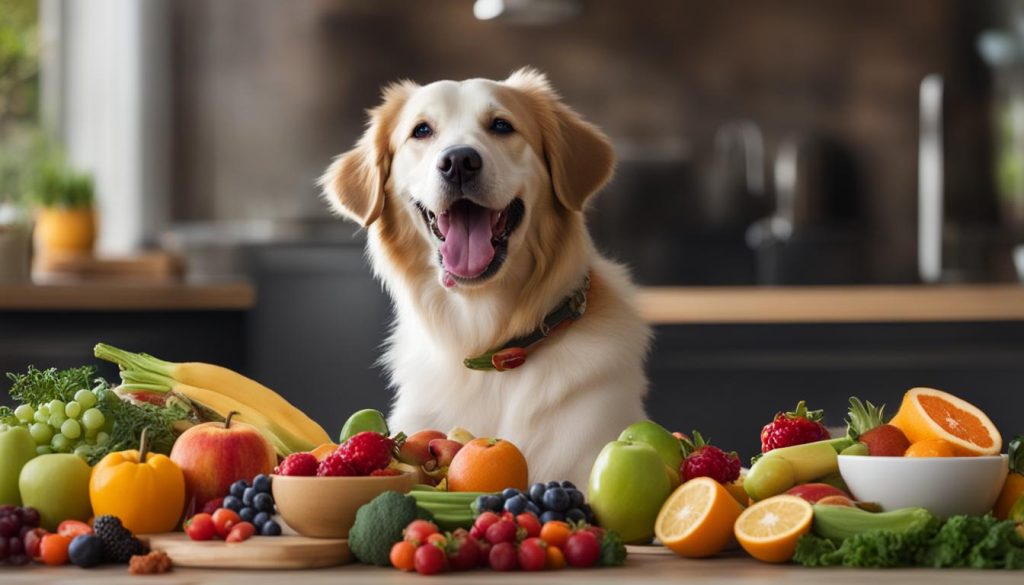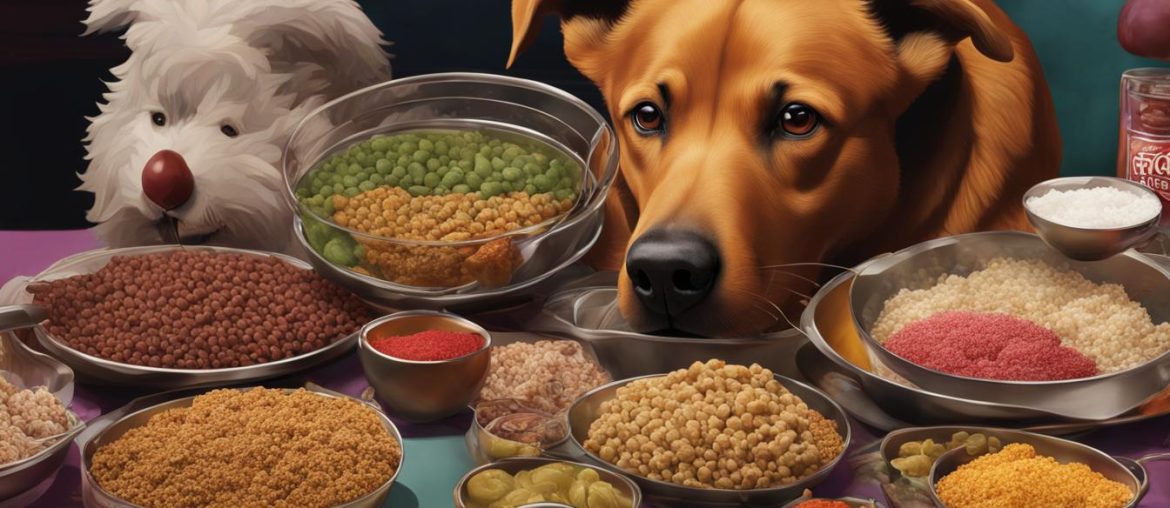Understanding how long it takes for a dog to digest food is essential for their overall health and well-being. The digestion process can vary depending on various factors such as size, age, activity level, and the type of food consumed. Let’s explore the intricacies of a dog’s digestion and gain insights into the average time it takes for them to digest their meals.
Key Takeaways:
- The digestion process in dogs can take anywhere from four to 12 hours.
- Factors such as size, age, activity level, and food type can influence digestion time.
- Dogs have a faster overall digestion time compared to humans.
- Creating a stress-free environment and providing a balanced diet are important for maintaining good digestion in dogs.
- Senior dogs may require special attention to support their digestive health.
The Digestive System in Dogs

The digestive system in dogs is a complex and important system responsible for breaking down food, absorbing nutrients, and eliminating waste. Understanding the canine digestion process can provide valuable insights into the overall health and well-being of our furry friends.
The digestive system in dogs consists of several organs and structures that work together to facilitate digestion. It starts with the mouth, where mechanical digestion begins as the dog chews and breaks down food into smaller pieces. The esophagus then carries the food from the mouth to the stomach, where it undergoes further breakdown through the process of chemical digestion.
The stomach is a muscular organ that produces acid and enzymes to break down proteins and other complex molecules. From the stomach, the partially digested food moves into the small intestine, where most of the nutrient absorption takes place. The small intestine is lined with tiny finger-like projections called villi, which increase the surface area for nutrient absorption.
“The digestive system in dogs is a complex and important system responsible for breaking down food, absorbing nutrients, and eliminating waste.”
After the small intestine, the remaining undigested food enters the large intestine, where water is absorbed and the formation of feces occurs. Finally, the waste is eliminated through the rectum and anus.
| Organs/Structures | Function |
|---|---|
| Mouth | Chewing and mechanical digestion |
| Esophagus | Transporting food to the stomach |
| Stomach | Chemical digestion and partial breakdown of food |
| Small Intestine | Nutrient absorption |
| Large Intestine | Water absorption and formation of feces |
| Rectum and Anus | Elimination of waste |
Understanding the digestive system in dogs is essential for providing them with a balanced and appropriate diet. The type of food, its quality, and the dog’s individual characteristics can all impact the digestion process. By taking into account the unique digestive needs of dogs, we can promote optimal digestion and overall health in our beloved pets.
How Long Does it Take for Dogs to Digest Food?

On average, dogs take four to eight hours to digest food, but it can take up to 12 hours. The digestion time varies based on factors like breed, size, food type, exercise, and the individual dog’s gut microbiome. Please be aware that this time refers to the entire digestion process, not just the time it takes for food to leave the stomach.
Different factors can influence a dog’s digestion time. Larger dogs tend to take longer to digest food, while smaller dogs may have a faster digestive process. The type of food also plays a role, with some foods taking longer to break down than others. Additionally, exercise can impact digestion, with dogs who are more active having a faster digestion time.
To better understand the digestion time of dogs, it’s important to look at the different stages of the digestive process. The food enters the dog’s mouth, where it is mechanically broken down through chewing and mixed with saliva. From there, it travels down the esophagus into the stomach, where it is further broken down through chemical digestion. The partially digested food then moves into the small intestine, where nutrients are absorbed, and waste products continue into the large intestine. Finally, the indigestible materials are eliminated as feces through the rectum and anus.
| Factors Influencing Digestion Time | Effect on Digestion Time |
|---|---|
| Breed and Size | Larger dogs may have a longer digestion time |
| Type of Food | Some foods take longer to digest than others |
| Exercise | More active dogs may have a faster digestion time |
| Gut Microbiome | The bacteria in the digestive system can influence digestion time |
Understanding how long it takes for dogs to digest food can help pet owners make informed decisions about their dog’s diet and overall health. By considering factors such as breed, size, food type, exercise, and gut microbiome, pet owners can ensure that their furry friends have a healthy and well-functioning digestive system.
Comparison to Human Digestion
When it comes to digestion, humans and dogs differ in terms of both the time it takes to digest food and the processes involved. While digestion in humans can take anywhere from 24 to 72 hours, dogs have a much faster overall digestion time, ranging from four to 12 hours. This means that dogs process food more quickly than humans, moving it through their digestive system at a faster rate.
To understand these differences, it’s important to consider the unique characteristics of each species’ digestive system. Dogs have slower gastric emptying in the fed state, meaning that food stays in their stomachs longer. However, once the food reaches their small intestine, it moves through more rapidly compared to humans. Dogs also have higher and more variable intestinal pH levels, which can affect the digestion process.
The variations in digestion time between dogs and humans can be attributed to several factors. One key factor is diet. Dogs are primarily carnivorous and have evolved to digest meat efficiently, resulting in a shorter digestion time. Additionally, canine digestive systems are adapted to process and absorb nutrients from raw food more effectively. In contrast, humans have a longer digestive tract designed to break down and extract nutrients from a wider variety of foods, including plant-based sources.
Table: Comparison of Canine and Human Digestion
| Aspect | Dogs | Humans |
|---|---|---|
| Gastric Emptying | Slower | Faster |
| Small Intestine Transit | Faster | Slower |
| Intestinal pH | Higher and more variable | Lower and more stable |
| Overall Digestion Time | Four to 12 hours | 24 to 72 hours |
While dogs and humans have different digestion processes and timeframes, both species benefit from a balanced and nutritious diet. Providing high-quality food that meets their unique dietary needs is essential for maintaining optimal digestive health. Additionally, regular veterinary check-ups and monitoring can help identify any potential digestive issues and ensure the overall well-being of both dogs and humans.
Factors Influencing Digestion Time
In the process of digestion, there are several factors that can influence the amount of time it takes for a dog to digest their food. These factors can include breed and size, the type of food being consumed, the dog’s age, and their gut microbiome.
Breed and Digestion Time
It is important to note that different dog breeds may have variations in their digestion time. Generally, larger breeds tend to have longer digestion times compared to smaller breeds. This is because larger dogs have larger gastrointestinal tracts, which means it takes longer for food to pass through their system.
Type of Food and Digestion Time
The type of food a dog consumes can also impact their digestion time. For example, dry kibble tends to take longer to digest compared to wet food. This is because dry kibble requires more water to break down and can take longer to move through the digestive system. On the other hand, wet food is already moist and can be easier for the body to process.
Age and Digestion Time
The age of a dog can also play a role in their digestion time. Puppies, for instance, tend to have faster digestion times compared to adult dogs. This is because puppies have more active digestive systems, allowing them to process food more quickly. Senior dogs, on the other hand, may have slower digestion times due to age-related changes in their digestive system.
Gut Microbiome and Digestion Time
The gut microbiome, which refers to the community of bacteria in a dog’s digestive system, can also influence digestion time. A balanced and diverse microbiome is important for optimal digestion. If the microbiome is imbalanced or lacking in beneficial bacteria, it can lead to digestive issues and slower digestion times. Prebiotics and probiotics can be beneficial in supporting a healthy gut microbiome.
| Factors | Influence on Digestion Time |
|---|---|
| Breed and Size | Larger breeds tend to have longer digestion times compared to smaller breeds |
| Type of Food | Dry kibble takes longer to digest compared to wet food |
| Age | Puppies have faster digestion times, while senior dogs may have slower digestion times |
| Gut Microbiome | A balanced and diverse gut microbiome is important for optimal digestion |
Understanding Digestive Irregularities

When it comes to your dog’s digestion, it’s important to understand that not all irregularities are cause for concern. One common occurrence that might seem worrisome is seeing your dog poop shortly after eating. However, this is often due to the gastrocolic reflex, which is a normal response of the digestive system. It triggers contractions in the colon after a meal, resulting in an urge to eliminate waste. So, don’t be alarmed if your dog has a quick bowel movement after eating. It doesn’t necessarily indicate an issue with their digestion.
That being said, if your dog experiences sudden or prolonged digestive irregularities, such as persistent diarrhea or discomfort during bowel movements, it’s important to consult a veterinarian. These symptoms can be indicative of underlying health issues or digestive upset that may require medical attention. Your vet can help determine the cause and provide appropriate treatment to alleviate any discomfort your dog may be experiencing.
Remember, every dog is unique, and what may be considered irregular for one dog may be normal for another. Pay attention to your dog’s overall behavior, appetite, and energy levels. If you notice any significant changes or concerns related to their digestive health, seeking professional advice is always the best course of action.
The Gastrocolic Reflex
The gastrocolic reflex is a natural response triggered by the presence of food in the digestive system. It stimulates contractions in the colon, resulting in the urge to eliminate waste, often shortly after eating. This reflex helps the body efficiently move food through the digestive tract and maintain healthy bowel movements.
While the gastrocolic reflex is generally a normal part of the digestion process, it’s important to be aware of any changes in your dog’s bowel movements or digestive patterns. Sudden or frequent diarrhea, constipation, or signs of discomfort during elimination can indicate a disruption in the normal functioning of the digestive system. Consulting with a veterinarian can help identify any underlying issues and provide appropriate treatment.
| Symptoms of Digestive Upset in Dogs | Possible Causes |
|---|---|
| Diarrhea or loose stools | Food intolerance, dietary changes, bacterial or viral infections, parasites, stress |
| Constipation or difficulty passing stool | Dehydration, lack of fiber, obstructions, underlying health conditions |
| Discomfort during bowel movements | Anal gland issues, inflammation of the colon, foreign objects in the digestive tract |
Regular veterinary check-ups, a balanced diet, and observing your dog’s behavior can help detect and address any digestive issues before they become more severe. By staying vigilant and seeking professional advice as needed, you can help ensure your dog maintains a healthy and comfortable digestive system.
Promoting Good Digestion in Dogs

Ensuring your dog has a healthy digestive system is essential for their overall well-being. There are several measures you can take to promote good digestion and support their digestive health.
Exercise and Digestion
Regular exercise plays a crucial role in promoting healthy digestion in dogs. It helps keep the bowels moving and promotes motility in the digestive tract. Aim for daily walks or play sessions to encourage proper digestion.
Creating a Stress-Free Environment
Stress can have a negative impact on the digestive system, so it’s important to create a stress-free environment for your dog. Minimize loud noises, maintain a consistent routine, and provide a comfortable space for relaxation. A calm and relaxed environment can help prevent digestive upset.
Hydration and Digestion
Adequate hydration is crucial for proper digestion. Make sure your dog has access to fresh, clean water at all times. Additionally, incorporating water-packed foods into their diet can help with hydration and support healthy digestion.
Diet and Digestion

Proper nutrition plays a vital role in maintaining a healthy digestive system in dogs. The impact of diet on digestion is significant, and pet owners should carefully consider the type of food they provide to their furry friends. One important factor to consider is the choice between wet food and dry kibble.
Wet food, also known as canned food, is generally easier to digest for dogs. It has a higher moisture content, which helps to soften the food and facilitate the digestion process. The higher water content also helps to keep the dog hydrated, which is essential for proper digestion. Additionally, wet food tends to have a higher protein content and fewer carbohydrates, which can be beneficial for dogs with sensitive stomachs.
On the other hand, dry kibble is a more convenient option for many pet owners. It has a longer shelf life, is easier to store, and can be left out for free-feeding. However, dry kibble has a lower moisture content and is generally harder for dogs to digest. It requires more water for proper digestion and can be less suitable for dogs with certain digestive issues.
In addition to the choice between wet food and dry kibble, the inclusion of fiber in a dog’s diet is also crucial for good digestion. Fiber helps regulate bowel movements, promotes the growth of beneficial gut bacteria, and aids in the absorption of nutrients. High-fiber foods, such as fruits, vegetables, and whole grains, can support a healthy digestive system in dogs.
The Importance of a Balanced Diet
When considering a dog’s diet and digestion, it is important to prioritize a balanced and nutritionally complete diet. A balanced diet should provide all the necessary nutrients, vitamins, and minerals that a dog needs for optimal health and digestion. Pet owners should consult with their veterinarian to determine the appropriate diet for their dog based on factors such as age, breed, size, and any specific dietary requirements or sensitivities.
| Diet Type | Advantages | Considerations |
|---|---|---|
| Wet Food | Higher moisture content for easier digestion | Shorter shelf life, can be more expensive |
| Dry Kibble | Convenient and longer shelf life | Lower moisture content, may be harder to digest |
| High-Fiber Diet | Promotes regular bowel movements and beneficial gut bacteria | May not be suitable for all dogs, consult with a veterinarian |
“Choosing the right diet for your dog is crucial for maintaining a healthy digestive system. Whether you opt for wet food or dry kibble, ensuring a balanced diet with appropriate nutrients and fiber can support optimal digestion and overall well-being.”
Digestive Health in Senior Dogs

As dogs age, their digestive system undergoes changes that can affect their overall digestive health. Just like humans, senior dogs may experience a slower digestion process, which can lead to issues such as constipation or decreased nutrient absorption. It is important for pet owners to be aware of these changes and take steps to support their senior dogs’ digestion.
One factor that can influence digestion in senior dogs is age itself. As dogs get older, their metabolism slows down and their bodies may produce less digestive enzymes, making it more difficult to break down food. This may result in longer digestion times and potential issues with nutrient absorption. Additionally, senior dogs may develop sensitivities or intolerances to certain foods, requiring dietary adjustments to maintain optimal digestion.
Supporting good digestion in senior dogs involves several key measures. First, providing a nutritionally dense diet that is appropriate for their age and specific needs is crucial. This may include choosing a senior-specific formula that is easily digestible and contains ingredients that promote gut health. Adding fiber to their diet can also help regulate bowel movements and promote good digestion.
Furthermore, regular exercise is essential for maintaining healthy digestion in senior dogs. Exercise helps stimulate bowel movements and promotes overall gut motility. It is important to tailor exercise routines to accommodate any limitations or age-related changes in mobility that your senior dog may have. Consulting with a veterinarian can help determine the appropriate level and type of exercise for your senior dog’s digestive health.
To summarize, senior dogs may experience changes in their digestive system as they age, including slower digestion and potential nutrient absorption issues. Supporting their digestive health involves providing a nutritionally dense diet, incorporating fiber, and ensuring regular exercise. Monitoring your senior dog’s digestion and consulting with a veterinarian can help address any concerns and maintain optimal digestive function in their golden years.
Table: Common Digestive Issues in Senior Dogs
| Digestive Issue | Symptoms | Treatment |
|---|---|---|
| Constipation | Difficulty passing stools, straining, decreased frequency of bowel movements | Increasing dietary fiber, ensuring hydration, exercise, and medication if necessary |
| Diarrhea | Loose, watery stools, increased frequency of bowel movements | Dietary adjustments, probiotics, medication if necessary, fluid therapy if severe |
| Reduced Appetite | Lack of interest in food, decreased portion sizes | Dietary changes, feeding smaller, more frequent meals, medication if necessary |
| Vomiting | Expelling stomach contents, nausea, drooling | Dietary adjustments, medication to alleviate nausea, fluid therapy if severe |
Wrapping Up
To summarize, maintaining a healthy digestive system is crucial for the overall health and well-being of dogs. The digestion process in dogs can vary, but understanding the factors that influence digestion can help pet owners promote optimal digestive function.
Providing a balanced diet that includes easily digestible food, regular exercise, and a stress-free environment are key to supporting good digestion in dogs. Adequate hydration is also essential for proper digestion, and pet owners should ensure that their dogs have access to fresh water at all times.
Regular monitoring of a dog’s digestive health and seeking veterinary attention when needed are important for detecting and addressing any digestive issues that may arise. By prioritizing healthy digestion, pet owners can help their dogs lead happy and comfortable lives.
FAQ
How long does it take a dog to digest food?
The digestion process in dogs can take anywhere from four to 12 hours, depending on factors such as size, age, activity level, and the type of food consumed.
What does the digestive system in dogs consist of?
The digestive system in dogs consists of the mouth, esophagus, stomach, small intestine, large intestine, rectum, and anus. It also involves the liver and pancreas, which contribute fluids and compounds for food breakdown.
How long does it take for dogs to digest food?
On average, dogs take four to eight hours to digest food, but it can take up to 12 hours. The digestion time varies based on factors like breed, size, food type, exercise, and the individual dog’s gut microbiome.
How does canine digestion compare to human digestion?
Dogs have a faster overall digestion time compared to humans. Dogs have slower gastric emptying in the fed state, faster small intestine transit, and higher and more variable intestinal pH. Humans take 24 to 72 hours to fully digest food, while dogs take four to 12 hours.
What factors influence a dog’s digestion time?
Several factors can influence a dog’s digestion time, including breed and size, type of food, age, and the individual dog’s gut microbiome.
What should I do if my dog experiences digestive irregularities?
If a dog experiences sudden or prolonged digestive irregularities, such as diarrhea or discomfort during bowel movements, it is important to consult a veterinarian.
How can I promote good digestion in my dog?
Several measures can be taken to promote good digestion in dogs, including regular exercise, creating a stress-free environment, adequate hydration, and providing a healthy diet with proper digestibility and nutrient balance.
How does diet impact a dog’s digestion?
Different types of food can affect digestion differently, with wet food being easier to digest than dry kibble. High-fiber diets can aid in digestion and promote regular bowel movements.
How can I support digestion in senior dogs?
As dogs age, their digestive system may slow down. Providing a nutritionally dense diet and avoiding rich or heavy foods can support a healthy digestive system in senior dogs.
What is the importance of maintaining a healthy digestive system in dogs?
Maintaining a healthy digestive system is essential for a dog’s overall health and well-being. Regular monitoring and veterinary attention are important for detecting and addressing any digestive issues that may arise.






